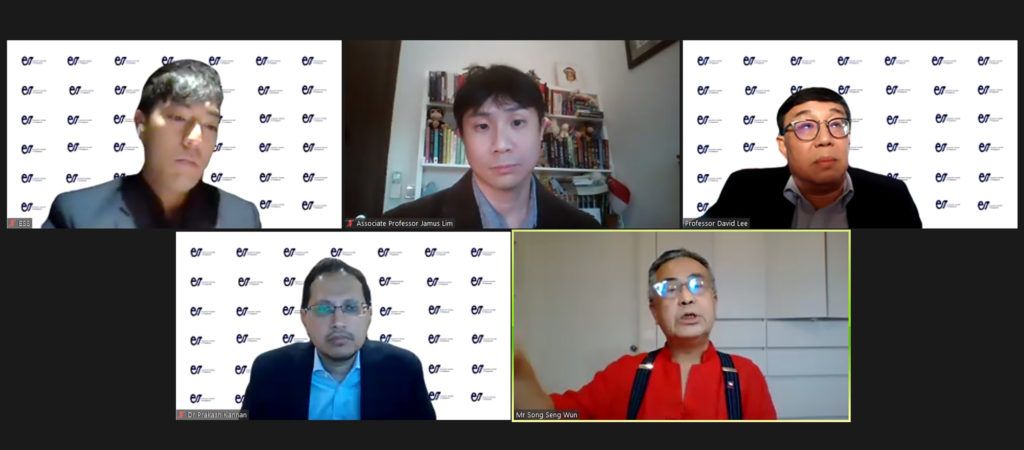
The third ESS webinar comes in timely during trying times as the world economy battles Covid-19 impacts and such impacts are exacerbated by the worsening relationship between United States (USA) and China in what many dubbed as a looming “Cold War 2.0”. Our panellists share their insights on whether the US Dollar (USD) will continue to be the dominant reserve currency in the world.
The webinar was held on 23th September 2020 and was chaired by Prakash KANNAN, Managing Director, Chief Economist and Head of Total Portfolio Management, GIC. For this webinar, we are pleased to have:
- David LEE, Professor at Singapore University of Social Sciences, and Vice-president of ESS
- Jamus LIM, Associate Professor of Economics, ESSEC Business School and MP of the 14th Parliament of Singapore
- Seng Wun SONG , Director of CIMB Private Banking
Right off the bat, Dr. Kannan alluded to several alternatives which are possible outcomes in the medium term:
- Euro may take over dominance in the coming years
- China’s RMB may take over such dominance
- It is possible that cryptocurrencies may take over as financial innovation accelerates, it might not necessarily be a sovereign issuer
Putting such options up for a live poll, majority of webinar attendees seem to believe that RMB will take away the most market share from USD.
As the first panellist to speak, Jamus believes such a trend is possible, albeit at a slow rate.
Laying some theoretical background and a general take on the matter, he presented the trend of dominance thus far. Past evidence depicts that USD enjoyed an overwhelming and unchanged dominance in the last 5 years (about 66% of world reserve currency) with Euro being a far second.
Addressing the live poll results, he shared that trend of private cross-border flows in Chinese financial assets has increased but remained a small amount (floating at around 4% of GDP). Further, dollar squeeze remains a challenge since most of the borrowing still USD-denominated. This indicates that there is still a lot of desire for more USD liquidity rather than liquidity of other forms.
However, he justified that switch in dominant reserve currency has been rather dramatic in the past, citing the switch from Great Britain Pound to USD after World War II. Therefore, it is not unlikely that USD will be dethroned suddenly.
What will trigger this shift then (if any)? Professor Lim commented most will depend on fiscal factors. Using the equation from basic Economics:
Money Supply*Velocity of circulation = Nominal value of output, or simply MV = PY
He commented that as long as the economy is large, you will expect more currency circulating both domestically and internationally (left hand side of the equation). Hence, geo-political tensions such as the current brewing trade war, whether Donald Trump wins the November 2020 election, and the Hong Kong/Taiwan sovereignty issue will play a part on each currency’s dominance.
In answering a question from attendees on how many dominant regions will emerge, Professor Lim further postulates a “tri-polar” currency dominance is not unlikely. We can have:
- Euro, in which there is a political will for it to succeed
- USD, depending on the USA debt ceiling serving as a fiscal discipline device
- RMB, depending on whether China rebalances her economy towards domestic consumption
Prof. David Lee agrees with the sentiment but goes further to argue for the “Tokenisation of economy” where cryptocurrencies (backed by community) and a new payment issuer not backed by a sovereign issuer, will emerge.
“Where everyone is the bank and the exchange, we don’t need a centralised institution to process our transactions!” he commented.
He presented several financial innovations such as the Central Bank Digital Currency (CBDC), Digital Currency Electronic Payment (DCEP) which is China’s successful initiative on a digital currency backed by the Central Bank, and the Blockchain Networks (BSN).
Such innovations will first, digitise the economy and secondly, move our payment systems towards tokenisation (using private cryptocurrency) and eventually “Debarter” the way banking system engages the public with Artificial Intelligence (AI), Blockchain, Cloud Digital Devices, 5G development and Quantum Computing.
With such convergence, there will be no need for a reserve currency. The role of banks and institutions will be dis-mediated by such Fintech engineering.
In answering one of the questions from attendees on such an evolution, he coined the shift process succinctly: from traditionally human governing other humans (using law and regulations) à AI governing human (in a lot of our trading process currently) à AI governing other AI in the future. For example, AI centres can pick up patterns of money laundering much more efficiently than traditional policing.
Seng Wun further distilled the views of previous two panellists by providing a perspective for Singapore. Where can we go from here and who can we put our trust in?
What is important for Singapore is the trading pattern with her trading partners.
For example, if Singapore’s trading networks with rest of ASEAN deepens in replacement of USA, then we might shift towards “de-dollarization” and replace it with a basket which places more weightage on ASEAN currencies.
Conversely, whether Singapore will hop on the bandwagon of cryptocurrencies which David presented will depend on how quickly ASEAN can embrace such technology. For example, if Singapore’s trade volume with China continues to increase rapidly in the next 10 years, then we will transit sooner towards the tokenisation systems, many which China pioneered.
He believes that in the next 10 years, at least, the USD’s dominance will continue, while the rest of the alternatives will continue to ramp up.
“They [referring to the alternatives to USD] are definitely a solution, but not a solution yet, for now.” He concluded. Indeed, the situation in the immediate future is uncertain and tumultuous as it is muddled by the Covid-19 pandemic. While a certain outcome is unknown, the webinar discussed several possible outcomes as the global economy maneuvres through the pandemic, trade and technological frictions. (By Jackson Teh-NTU)
